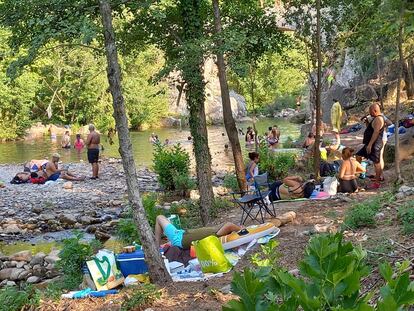First it was the mountains and now it is the pools (
gorgs
, in Catalan) and the rivers.
The overcrowding of these spaces in summer has led to dozens of Catalan municipalities planning or already applying management plans to contain uncontrolled access to their waters.
The power to cut off access to roads or install paid
car parks belongs
to the councils, but the Generalitat is working to create a common plan to unify criteria and measures in coordination with the Girona Provincial Council, as well as deploying an information service in municipalities of the province, the most crowded area in these spaces.
The budget of the Ministry of Climate Action for the first pilot test is 383,000 euros.
The initiative was undertaken in 2021 by the non-profit foundation Emys, which last year began a test to implement measures in overcrowded areas.
The measures worked, and since then fifteen town councils have asked the foundation for advice and have approved use plans.
Ivette Casadevall, spokesperson for the foundation, explains that the town councils interested have now risen to thirty and she sees it likely that many others will join in the coming months, also in the province of Tarragona.
In 2019, the Girona Provincial Council made a catalog with the most sensitive areas.
"No one can be prohibited from bathing, but what the city councils can do is take dissuasive measures to put a cap on the spaces and maintain their state of conservation," explains Casadevall.
The spokeswoman sees it necessary to unify the criteria and expand areas because since measures have begun to be applied in certain places, it has been observed how visitors have moved to neighboring towns, without restrictions, to search for other areas.
“Nature is not being privatized.
What we are doing is managing.
After the pandemic, it seems that people have rediscovered rivers and now everyone is coming.
They think they will find more solitude, more tranquility and a closer contact with nature, but when they arrive they find that this is not the case because the place is full of people”, she emphasizes.
Some crowded pools in Sant Llorenç de la Muga during the summer of 2021Fundació Emys
Sources from the Rural Agents body, a surveillance body in the natural environment, agree that after the confinement due to the coronavirus, people got closer to these water spaces, previously less traveled.
And that recklessness also increased: from people who made fires in unauthorized spaces to people who swam in dangerous areas.
They also alarm about poaching and garbage accumulated on the slopes of rivers.
Last July, the Government of Catalonia deployed, in coordination with the Girona Provincial Council, a service of environmental informants in the municipalities of Canet d'Adri, Santa Pau, Vidrà, Camprodon, Sant Llorenç de la Muga, Albanyà, Vall d' in Bas i Sales de Llierca and the mighty river Ter with the aim of "sensitizing visitors and promoting good practices in these spaces".
The Minister of the Department of Climate Action of the Generalitat, Teresa Jordà, defended at the beginning of July that the objective is to promote responsible use and avoid crowds and uncivil behavior to also guarantee the safety of visitors.
Ella Jordà also believes it is necessary to create a “legal framework to regulate the public use” of these spaces.
The legal framework to which the minister refers is similar to the one that began to be deployed last year to avoid overcrowding in the Catalan mountains.
The viral image in September 2020, after the lifting of restrictions, of dozens of hikers queuing to take a photo on the highest peak in Catalonia, the mythical Pica d'Estats (3,143 meters), forced the Generalitat to promote a common plan and agreed with municipalities of mountainous areas measures to cut overcrowding in the mountains.
The Government also reinforced the presence of the Mossos d'Esquadra and the Rural Agents.
The measure that spread the most, and at the same time caused the most controversy, was to apply paid
car parks
and cut off access to particularly busy roads.
A year later, the Generalitat presented results in particularly sensitive areas such as the Parc Natural del Alt Pirineu, in which the figures had been significantly reduced.
In a conversation with this newspaper, its director, Marc Garriga, was satisfied with the results, although he asked to further extend the controls to other territories and make them perpetual.
You can follow EL PAÍS Catalunya on
and
, or sign up here to receive
our weekly newsletter

